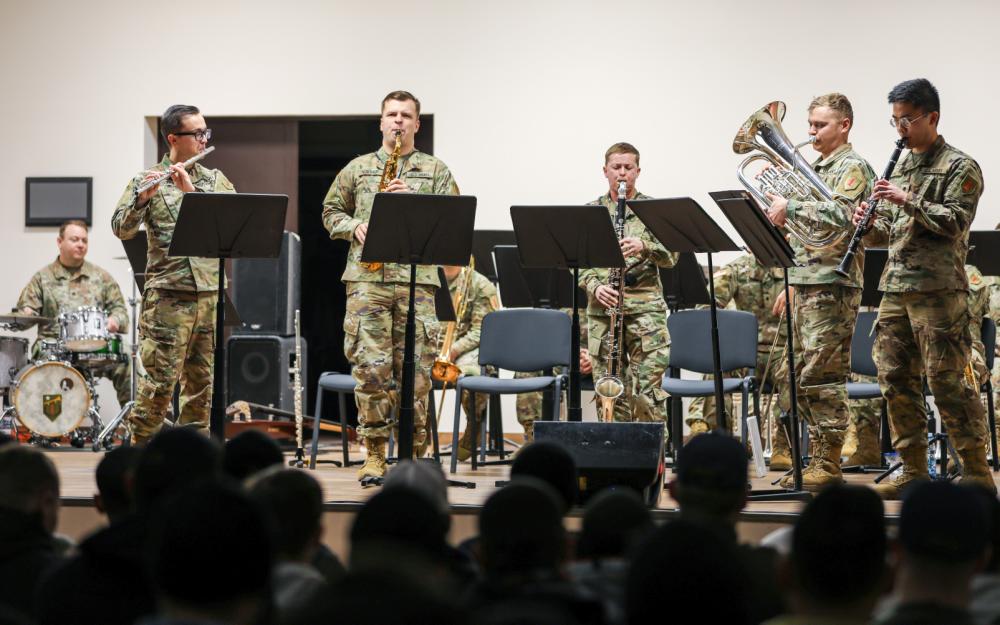DVIDS – News – Master of One
ĀDAŽI, Latvia – There are currently over a hundred entry level military occupational specialties (MOS) available to choose from the moment a potential candidate decides to enlist into the Army. The MOS selection relies solely on the Armed Services Vocational Aptitude Battery test score scheduled for candidates prior to enlisting. Once selected, Soldiers go through basic combat training as well as advanced individual training (AIT) for their specific MOS. After graduating from AIT with the skills they’ve learned, they report to their assigned unit in hopes to advance their skillset.
“When I talk about building your expertise I mean in your trade, whatever your MOS happens to be and in your Soldier skill,” said Command Sgt. Maj. Robert V. Abernathy, command sergeant major of U.S. European Command.
Although each MOS requires proficiency in various technical skills to achieve Warfighting Mastery, Soldiers are aware of what it takes to achieve it.
“Flexibility and good work ethic is very important to being a master at my MOS,” said Spc. Mark Northup, a saxophonist for the 1st Infantry Division (1 ID) Band. “Being in the band, we often get tasked last minute with musical missions and sometimes last minute with non musical tasks.”
While being a part of the Army Band takes flexibility and work ethic, vision and creativity is key in communicating the Army and individual Soldier’s story.
“When we’re really good at our jobs is when we’re really telling a different angle of a large story,” said Spc. Charles Leitner, a mass communication specialist for 1 ID.
From behind the camera to behind the wheel, proficiency and logistical expertise provides maximum maneuverability on the battlefield.
“To be a master at this MOS, it means to be proficient in all systems and guidance to move anybody or anything at any time,” said Staff Sgt. Steve W. Hill, a transportation management coordinator with the 1 ID Artillery.
On the battlefield, Soldiers in the medical field require the understanding of the healthcare necessities so ensure a stable and efficient fighting force.
“Mastering my MOS means being able to feel purpose in everything it means to be a health care professional and a Soldier,” said Spc. Sean Angelo B. Abante, a health care specialist with the 2nd Battalion, 82nd Field Artillery Regiment, 3rd Armored Brigade Combat team, 1st Cavalry Division operationally controlled by the 1 ID. “This is an ever changing MOS that requires you to learn from others.”
Diversity and flexibility within the battle space creates an environment of confidence for those Soldiers on the front lines.
“MOS Mastery is learning both a gunners stance and a team chiefs status,” said Spc. Cristina Fuentes-Mendoza, an air and missile defense crewmember for Bravo Battery, Death Dealers, 2nd Battalion, 174th Air Defense Artillery Regiment operationally controlled by 1 ID. “It’s important to learn the in-depth ability of someone else’s job just in case they aren’t there or they get replaced.”
Regardless of what your MOS is, becoming a master at your MOS requires dedication, hard work and knowing how to achieve that level of mastery.
“Staying up to date with the constant changes in medicine helps any medical personnel provide the best and effective treatments for those we look over,” said Abante. “Medicine is a practice more than a skill, which means, the continuous study and avid reading does not stop after TRADOC.”
Part of achieving that level of mastery is being able to receive feedback from those around you.
“Put yourself out of your comfort zone, I find myself doing that more often than I thought I was gonna be,” said Leitner. “Find good editors that’ll be really honest with your work and will pull you in solid directions who see something in your work.”
For Soldiers who are just starting their military career, receiving advice from those who have been doing their specific MOS will help Soldiers achieve that level of mastery and prepare them for the challenges and struggles that may occur along the way.
“My advice for the new 68W is to remember we are a part of a much more extensive and procedural process to provide people definite answers,” said Abante. “Remembering our purpose will help us overcome doubts and maintain the confidence the service members have in us 68W.”
The military is always advancing in doctrine, equipment and policy so staying up to date with everything is crucial for mastery.
“Read like a monster, study some of the great photographers, study some of the great writers, some of the great journalists and create a portfolio of the work you’re interested in and add them to your toolbelt,” said Leitner.
Fortitude and perseverance of masters of military specialties builds confidence and stability essential to success in and out of the uniform.
“Access your strengths and weaknesses, then find a way to make your weaknesses stronger,” said Northup. “Come in everyday ready to work and get better at whatever it is you’re doing.”
The effectiveness of the U.S. Army is built upon the foundation of warfighting mastery, of those specialties in direct conflict on the battlefield or those specialists that support the fighting force, each is necessary for the might of the organization.
“If we don’t do our job, then the mission fails,” said Hill. “I never want the mission to fail.”


 Private Internet Access gives you unparalleled access to thousands
of next-gen servers in over 83 countries and each US state. Your
VPN experience will always be fast, smooth, and reliable.
Private Internet Access gives you unparalleled access to thousands
of next-gen servers in over 83 countries and each US state. Your
VPN experience will always be fast, smooth, and reliable.
![DVIDS – Images – Cobra Gold wrap up CALFEX [Image 3 of 6] DVIDS – Images – Cobra Gold wrap up CALFEX [Image 3 of 6]](https://101veterans.com/wp-content/uploads/2025/03/1741633316_1000w_q95.jpg)
![DVIDS – Images – Osan AB accepts expeditionary forces [Image 3 of 5] DVIDS – Images – Osan AB accepts expeditionary forces [Image 3 of 5]](https://101veterans.com/wp-content/uploads/2025/03/1741590056_1000w_q95.jpg)